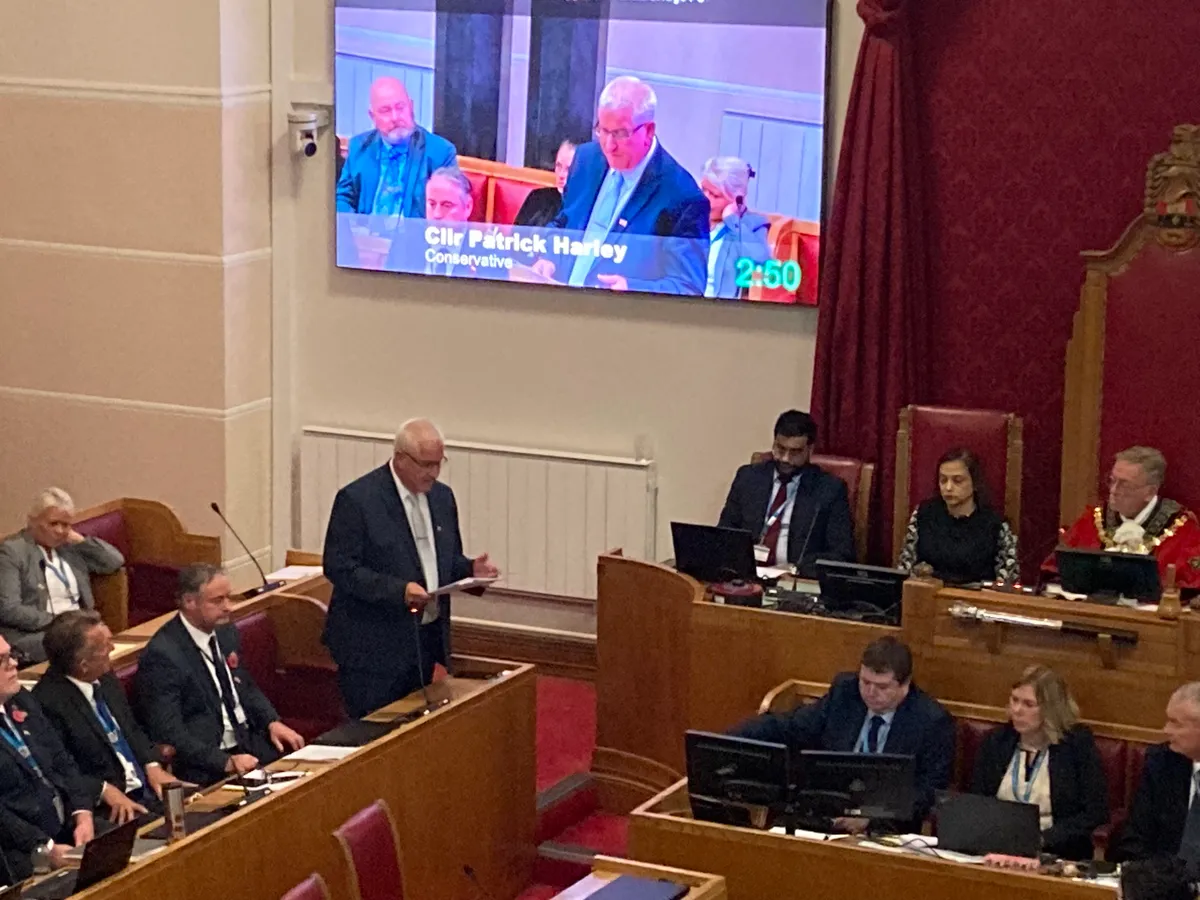Copyright cleveland.com

CLEVELAND, Ohio — A fight is brewing inside Cuyahoga County government over who should have authority over county contracts and legal advice, pitting Prosecutor Michael O’Malley against County Executive Chris Ronayne and his law department in a battle that may ultimately have to be decided in court or by voters. At issue is whether the county prosecutor or the county law director should be in charge of drafting, reviewing and negotiating county contracts, as well as advising county departments on legal matters. O’Malley argues those duties belong under his authority, citing a recent opinion from Ohio Attorney General Dave Yost that said state law governing Ohio’s commissioner-lead counties gives the prosecutor most legal responsibilities. But Ronayne maintains that the county charter intended something different in creating a law department specifically to help carry out the executive’s duties, which include overseeing departments, negotiating labor contracts and signing off on agreements. Officials initially pledged to resolve the dispute quickly, but tensions escalated last month in an email exchange that Ronayne interpreted as a legal threat. Ronayne had asked O’Malley to provide a framework for what the transition might look like, detailing the duties and responsibilities of each legal office. In response, O’Malley pointed only to an earlier attorney general opinion from 2011, which suggests that the law director can advise the executive and council, but the prosecutor should advise all other departments, boards and staff. “That is the division we anticipate going forward in Cuyahoga County,” O’Malley wrote in his Oct. 21 email to Ronayne. “If it is not resolved this week, I will direct my staff to move forthwith to bring the county into compliance with the county charter and state law.” Ronayne fired back the next day against what he called O’Malley’s “clear threat of litigation.” He rejected O’Malley’s deadline as “unreasonable” and “dangerous,” saying it would “unravel nearly fifteen years of established County government practice and cooperation,” disrupting county services and costing taxpayers unnecessarily. Instead, Ronayne proposed letting voters decide the responsibilities of the two offices through a charter amendment. It’s something officials considered doing back in 2013, before leaders at the time came to a formal agreement to share responsibilities instead. O’Malley later amended that agreement in 2017 but otherwise kept the arrangement intact. “As you know, there has never been widespread agreement that the 2011 Attorney General opinion represents compliance with the county charter, state law, or the will of the voters who overwhelmingly passed charter reform in 2009,” Ronayne replied in his email. “Please let me know if you’d like to work together on an amendment that allows the voters to clarify this issue.” Cause for change? Since the charter change, there has been confusion – and compromise – over who handles what legal duties. A series of memorandums of understanding between the prosecutor and law department have divided responsibilities, the most recent of them giving O’Malley’s office all litigation, while the law department has advised the executive, council and other departments, and managed collective bargaining. But this year O’Malley said he no longer thinks that division is working, citing “issues” over the years and what he perceives as a lack of proper checks and balances, because the law director is appointed by the executive. He sought to reclaim duties the law department has held for more than a decade. “The county needs an impartial legal adviser,” O’Malley told cleveland.com and The Plain Dealer in a recent interview. “And what we’re seeing in this government is that that impartial legal advice has been cast away.” O’Malley did not give examples to support his view and later clarified that his words were not a direct criticism of Law Director Richard Manoloff, whom he called “a very decent man and a good lawyer.” O’Malley declined to answer questions about whether appointed law directors in cities like Cleveland, Cleveland Heights and Lakewood are also unable to provide impartial advice. But he pointed to several examples that he said prove “this arrangement isn’t in the best interest of the county,” sometimes resulting in costly lawsuits. He cited former assistant law director Emily McNeeley’s conviction for managing contracts involving her family members, deaths in the county jail that have cost millions in settlements, and changes to the sheriff’s pursuit policy following crashes that killed innocent bystanders. He also noted the county’s recent proposal to sell delinquent property taxes to a private debt collector without consulting his office, which handles foreclosures. His staff has since reviewed the contract and recommended tweaks to increase county revenue. “There’s been more litigation that’s being thrust on the county than ever before,” O’Malley said, “And Michael O’Malley, the county prosecutor, would argue that much of it is because the county does not operate nearly as efficiently as it did in times past, pre-charter.” Ronayne’s Chief of Staff Erik Janas, however, dismissed O’Malley’s criticisms as “a false narrative.” He said the law department often consults the prosecutor’s office on complex matters, but remains a capable legal entity on its own, handling nearly 7,000 legal matters this year. Janas especially vouched for Manoloff’s character and legal counsel. “We don’t accept (O’Malley’s) premise that impartial legal advice has been cast away,” Janas said, “as would any municipal law director or any ethical lawyer, period.” Behind the legal debate Beyond the legal questions, the dispute also appears to be about resources. An email from O’Malley’s spokeswoman, Lexi Bauer, accused the law department of having “bloated” staffing and salaries. She pointed to the law department’s 19 attorneys – including the law director – compared to O’Malley and his 17 civil attorneys as evidence, noting that some of the law department’s attorneys earn higher salaries than the prosecutor himself. More personally, she noted the county’s communications team and budget are also bigger. “Our office generates more news stories weekly than all county departments combined and four of their communications employees make more than me and all of them make more than Anna (the other staffer),” Bauer said. Following Yost’s ruling, O’Malley said he expected the law department to start downsizing as duties shift to his office, and he plans to hire more staff to handle the new workload, though he could not say how many he will need. “I think we could provide a great product with fewer employees,” he told cleveland.com. “I think the law department does a good job. I don’t think the (charter) framers had in mind doubling the size of departments.” For now, Janas said the county has no intention of cutting attorneys, though it has been downsizing other departments through a hiring freeze. He defended the law department’s expansion over the years to meet the growing workload, which now includes thousands of public records requests, hundreds of contracts and labor negotiations with 33 collective bargaining units. The county also turned over financial records comparing salaries for the law department to O’Malley’s civil division. It showed that Manoloff is paid an annual salary of $207,584, while O’Malley is paid $163,647, as set by state law. However, the majority of Manoloff’s assistants are paid less than O’Malley’s, while Manoloff’s supervisors are paid more. On average, though, the difference in pay between the two groups remains about 1%. “We have data and information to show that our folks are working harder and smarter than ever,” Janas said. What happens now? Officials continue to say they are committed to working together to adjust the division of powers and come to an amicable resolution, but a sticking point remains over which office should handle county department contracts. David Lambert, civil division chief for the county prosecutor’s office, told cleveland.com that he’s met with county officials to discuss the transition but says they’re “pushing back” against Yost’s opinion. “They insist that they should be advising anyone who is an appointee of the county executive,” Lambert said. Janas admits that the county wants the law department to serve as the central legal adviser for departments that report directly to the executive and help craft legislation governing county policies, contracts and functions. They include departments such as health and human services agencies, the sheriff’s office, public works and information technology, but not the prosecutor’s office or the courts, which operate separately. “I think the charter is clear that the law director provides legal advice and guidance to the executive and to the council,” Janas said. “What we would look forward to sitting down and talking through with the prosecutor’s office is how that works for employees of the executive.” At the core of the disagreement are competing interpretations of the charter, past agreements and the attorney general’s opinion – and how those should define the county’s power structure. But whether it’s ultimately settled through compromise, or the courtroom remains to be seen. In a second email exchange later the same week, O’Malley accused Ronayne and his staff of not “accepting reality” or cooperating with the transition as Yost’s opinion suggests. “Talk is cheap,” O’Malley wrote. “If you believe (the opinion) is meaningless, it is probably best to have a judge weigh in. I am of the belief that it will carry great weight before a court.” “Talk is cheap, but words matter,” Ronayne replied, laying out a timeline of his requests for details and meetings that O’Malley’s team postponed or cancelled. He accused O’Malley’s office of not acting in good faith by making “continuous threats of litigation” that he said would cost taxpayers “thousands and thousands” of dollars; and he questioned why O’Malley himself agreed to the division of duties in 2017, if he believed they violated the law. “In fact, your failure to comply with the AG’s opinion for more than eight years leads me to question your motives for attempting to upend 15 years of practice in a matter of weeks,” Ronayne wrote. Cleveland.com reached out to O’Malley at the end of October to ask whether his office had taken or plans to take legal action if Ronayne fails to comply. He did not answer directly. “It is incumbent upon all county officers to follow the law,” O’Malley said in an emailed statement to cleveland.com. “Consistent with our oaths of office, that is precisely what I anticipate the executive and I will do.”



